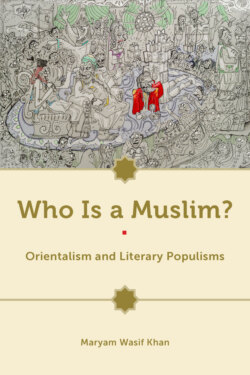Who Is a Muslim?

Реклама. ООО «ЛитРес», ИНН: 7719571260.
Оглавление
Maryam Wasif Khan. Who Is a Muslim?
CONTENTS
NOTE ON TRANSLITERATION
Vowels
Consonant
Introduction
Orientalism and Secular Critique
Confronting the Literary Canon
The Postsecularist Politics of Populism
A History of Literary Populisms
1 / Mahometan/Muslim: The Chronotope of the Oriental Tale
Reframing the Mahometan: The Politics of the Oriental Tale
The Mahometan on the Move: Trade and Masquerade in the Oriental Tale
Dark Magic and Transmigration: The Indic Undoing of the Mahometan
2 / Hindustani/Urdu: The Oriental Tale in the Colony
William Jones and the Mahometan Chronotope: India Against Islam
John Gilchrist and the New Vernaculars of India
The Oriental Tale in Hindustani/Urdu: The Case of Mir Amman’s Bāġh-o Bahār
Against Hindustani: The Dāstān, the Qișșā, and Fort William College
Literature in Colony: Creating a Canon for Hindustani
“The Best and Cheapest Book in the Hindustani Language”: Bāġh-o Bahār, Textbook and Translation
3 / Nation/Qaum: The “Musalmans” of India
New Tales for Old: Nazir Ahmad’s Mirāt al-‘Arūs and the Invention of a Muslim Domesticity
The Repentant Mahometan: Taubat an-Nasūĥ and the Invention of a Modern Muslim Literature
Mothers for the Muslim Qaum: Altaf Hussain Hali’s Majālis un-Nisā, or the Assemblies of Women
Empires for the Qaum: Abdul Halim Sharar’s Invention of a Popular Muslim Past
4 / Martyr/Mujāhid: Muslim Origins and the Modern Urdu Novel
Rashid ul-Khairi, the “Painter of Sorrow”: Tragedy, Didacticism, and the Threat of Women’s Emancipation
Kingdom and Conquest: Nasim Hijazi, the Novel, and Muslim Origins in India
The (Nation-) State of Sin: Razia Butt and the Feminine Martyr
5 / Modern/Mecca: Populist Piety in the Contemporary Urdu Novel
Pious Poverty: Humsafar and the Religio-Class Politics of Post-9/11 Pakistan
Overcoming Jahiliyyā: Conversion in Umera Ahmad’s Shehr-e Zāt and Nimra Ahmad’s Jannat kē Patē
The Hypocrites: Minority in Umera Ahmad’s Pīr-e Kāmil and Bushra Rehman’s Pārsā
Epilogue: Us, People / People Like Us
1971: A History from the Peripheries
Zindā Bihār: Nationalisms of the Stateless
Zindā Bahār Lane: Other Stories, Other Histories
ACKNOWLEDGMENTS
NOTES. Introduction / Who Is a Muslim?
1 / Mahometan/Muslim: The Chronotope of the Oriental Tale
2 / Hindustani/Urdu: The Oriental Tale in the Colony
3 / Nation/Qaum: The “Musalmans” of India
4 / Martyr/Mujāhid: Muslim Origins and the Modern Urdu Novel
5 / Modern/Mecca: Populist Piety in the Contemporary Urdu Novel
Epilogue / Us, People / People Like Us: Fehmida Riaz and a Secular Subjectivity in Urdu
INDEX
Отрывок из книги
WHO IS A MUSLIM?
for my Amma, Zeba Aziz; and my Abu, Wasif M. Khan, who love me in the bravest and best of ways.
.....
While Mahmood admits that the assumption of a pure religious reclamation is “easy to dismiss,” she asks her readers to refrain from casting doubt in a “context where the distinction between the subject’s own desires and socially prescribed performances cannot be easily presumed and where submission to certain forms of (external) authority is a condition for achieving the subject’s potentiality.”30 Mahmood’s defense of piety movements and attendant teachings, thus, is premised on the condition that the observer refrain from questioning the paradigms and social formations within which the subject exercises desire. By sequestering off the terms with which piety movements establish authority, Mahmood absolves herself of the task of both critique and historicization, but also seems to suggest that others also refrain from such intellectual exercises. Mufti has called this tendency “ethnographic philanthropy,” or the condition by which the “postcolonial liberal Western subject … closes off in advance any possibility of engagement and critical involvement in the postcolonial societies and communities in question.”31 Mahmood’s gesture, the closing off of critique, though clearly an example of this kind of philanthropic orientation, eludes the task of delving into the historical processes that have created these socio-ethical conditions.
My use of the term “religio-populist” to describe these evangelical novels, the socio-political influence they exercise, and the associated revivalist ideologies that they prescribe should not be read as a testimony of the secular humanist’s “commitment to the poetic resources of the Judeo-Christian tradition,” but rather as a means of comprehending the ultimate and most present iteration of the long orientalist literary project in North India.32 From different vantage points, Mufti and Abbas separately remind us that modern Islam, above all its Sunni rendition, with its legalistic-theological leanings, its totalizing tendencies, its claims of pure origin, and its condemnation of all other claimant forms of practice, Shi’ism included, is symptomatic not of “a return of religion, but of its historical transformations under the conditions of late, postcolonial capitalism.”33
.....